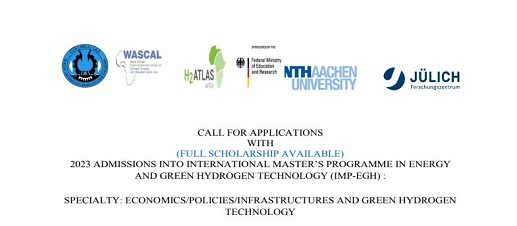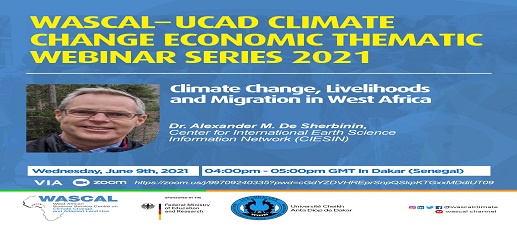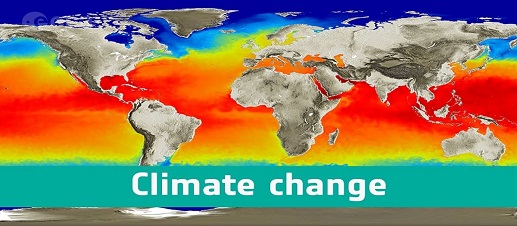CALL FOR APPLICATION 2023




Owodon AFO-LOKOAdoption de l'agriculture intelligente à Tandjoare - Togo comme option d'atténuation des changements climatiques: Une étude de cas du labour de conservation Greenhouse gases concentration increased significantly over the last decades causing a change in climate. IPCC (2014) reported that the emission of carbon dioxide in the last four decades (1970-2010) is equal to the carbon dioxide emission in the centuries 1750-1970 and the emission growth rate has increased from 1.3% per year between 1970 and 2000 to 2.2% between 2000 and 2010. Download |
|
Amadou Binta BAClimate change and Sustainable Intensification in Senegal: A Case Study of the Organic vegetable Farming System in the Niayes Region Climate change is one of the most important issues that the world is currently facing. The concept of “Sustainable Intensification (SI)” in agriculture has recently emerged and is becoming a common term much used in discussions around the future of agriculture and food production in the face of climate change. The sustainable intensification is considered as an approach that entails increasing food production from existing farmland in ways that have lower environmental impact and do not undermine food production in the future. Download |
|
Ebo BOTCHWAYEstimating the Impact and Spillover Effects of Climate Change on Crop Yield in Northern Ghana In tropical regions of the world human-induced climate change is likely to impact negatively on crop yields. To investigate the impact of climate change and its spillover effect on mean and variance of crop yields in northern Ghana, the Just and Pope stochastic production function and the Spatial Durbin model were adopted. Surprisingly, the results suggest that both precipitation and average temperature have positive effects on mean crop yield during the wet season. Download |
|
Awolala, David OlufemiExtreme Weather Events and Market-based Adaptation: Modelling the Potential Viability of Rainfall Index Insurance in Central-West Nigeria On a global scale, in the past 20 years, the failure of climate change mitigation and adaptation has risen to the top of the most impactful risks for the next decade, ahead of water crises ranking third. Global risks remain a serious development concern because of their combined profound impact and likelihood involves some economic risks, food security risks, and the climate-water nexus. The changing climate and weather patterns could jeopardize food security and agricultural production across geographies, presenting enormous threats to the foodbaskets of the world and most climatevulnerable countries that are heavily depend on agricultural productivity to sustain economic growth and development. Download |
|
Kouame BossombraReforestation and Climate Mitigation in Côte d’Ivoire: A Cost Benefit Analysis of the Bouaflé Protected Forest Forests play a key role in the environmental balance and act as a livelihood provider for people especially for the surrounding population. Côte d'Ivoire located in West Africa, has a high level of biodiversity, mainly on forested land. Like other countries of this region, Côte d’Ivoire has suffered severe deforestation since the 60s. However, deforestation and forest degradation release Greenhouse Gases into the atmosphere which contributes to Climate Change. In order to reduce deforestation, many actions are taken globally and locally. Download |
|
Abraham, Terfa WilliamsCan Financial Innovation Mitigate Adverse Effect of Climate Change on Rural Household Income? Evidence from Northern Nigeria Most households in Rural Northern Nigeria are engaged in farming hence exposed to the vagaries of Climate Change. Their continued lack of access to financial resources, however, limits their capacity to adapt. This study examines the effect of financial innovative strategies (access to formal credit, traditional crop insurance and farmers’ savings clubs) as a recipe for Climate Change Adaptation on rural farm households distributed along income quintiles in rural Northern Nigeria. Evidence from the 320 questionnaires administered in two rural communities (Rijau and Fakai) was analyzed using descriptive methods and ordered logit regression model. Download |
|
Tiertou Edwige SOMEATTENUATION DES EMISSIONS DE GAZ A EFFET DE SERRE DANS LE SECTEUR AGRICOLE : COMPROMIS OU GAIN POUR LES PETITS PRODUCTEURS AGRICOLES EN ZONE SOUDANO-SAHELIEN DU BURKINA FASO ? Climate changes talks regularly underline that developing countries’ agriculture could play a stronger role in greenhouse gases (GHG) mitigation strategies and benefit from market internalization of emission reductions or subsidies from the Kyoto Protocol program of subsidies. Agriculture can contribute to carbon mitigation by storing more carbon in the soil through greener cropping systems, by planting perennials and by raising livestock differently. In this context, a growing number of researchers have started to investigate how developing countries can contribute to these objectives. Download |
|
Aboubakr GAMBO BOUKARYRésilience des Ménages à l’Insécurité Alimentaire et Stratégies d’Adaptation aux Changements Climatiques au Niger Niger is a landlocked country where rainfall is characterised by high inter-annual and spacetime variability. It faces many natural and human constraints that explain the erratic evolution of its agricultural production. In addition, since signing the African Union Maputo Declaration of 2003 of keeping expenditure on agriculture to at least 10% of the national budget, Niger has surpassed this share, however, the problem of food security still lingers. Hence our research topic: Households’ Resilience to Food Insecurity and Adaptation Strategies to Climate Change in Niger. Download |
|
Alice BONOU
|
|
Ahmadou Hamady Dicko
|
|
Copyright © 2026,